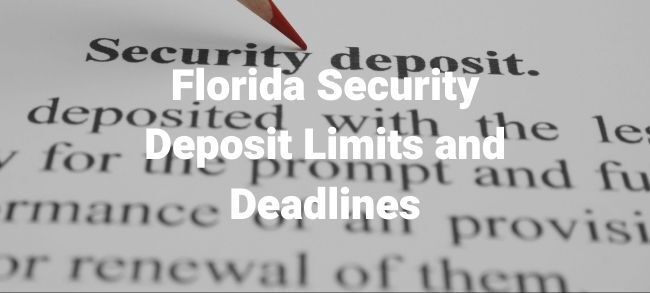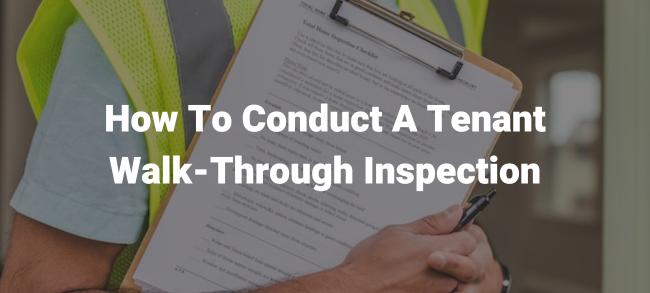Florida Security Deposit Limits and Deadlines

Property ownership and lease management can be complex, in particular when landlords require certain fees before a tenant can move in. One such fee is the tenants security deposit. Under normal conditions, the security deposit is refundable to the tenant once the lease ends.
Florida, just like other states, has a security deposit law in place. The law stipulates how landlords must handle their tenants’ security deposits. If you are a landlord in Florida, the following is everything you need to know about handling a tenants security deposit.
Why Landlords Collect Security Deposits
There are multiple reasons for why landlords collect security deposits. By collecting a tenant's security deposit, Florida landlords can safeguard themselves against financial liabilities emanating from:
- Failure by the tenant to pay rent.
- Excessive property damage caused by a tenant’s negligent actions.
- Unjustified lease termination. For example, breaking the lease to move closer to the new place of work.
- Failure by the tenant to clear their utility bills when moving out.
- Property abandonment by the tenant.
If the tenant does any of the above, you have a right to make deductions from their security deposit. However, Florida security deposit laws do state that the security deposit cannot cover normal wear and tear.
Are There Limits to How Much Landlords Can Charge as a Security Deposit?
No. Florida security deposit law states that Florida landlords aren’t limited to how much security deposit they can charge their tenants. But even in the absence of such a limit, landlords in Florida generally don’t charge a deposit exceeding that of two month's rent.
This security deposit practise works because landlords understand how counterproductive overcharging their tenants can be. It may make filling vacancies harder and increase tenant turnover rates if tenants struggle with the advance rent payment.

How Must Landlords in Florida Store Security Deposits?
Florida landlords must store their tenants’ security deposits in either of the following three ways:
The first option you have is storing your tenant’s security deposit in a normal account. The non-interest-bearing account must be located within Florida. Also, you must not commingle the tenants security deposit with any other funds.
The second option you have is storing the tenant’s security deposit in a separate interest bearing account. You must adhere to some rules in this regard. That is, not mixing the money with your personal funds, and paying the interest directly to the tenant. Should the tenant break their lease, no interest will be due to you.
The third and last option you have is posting a surety bond. The surety bond must be in the amount of the security deposit, or $50,000, whichever is less.
Do Tenants have a Right to be Notified After Receipt of Their Deposit?
Yes. As a landlord, you must send an initial written notice no more than than 30 days after receiving their security deposit. This must be a written notice and must state the following:
- Where and with which financial institution you are holding the tenant’s security deposit.
- How you are storing the tenant’s Florida security deposit, be it in a non interest bearing account or otherwise.
If storing the tenant’s security deposit in a seperate interest bearing bank account, the amount of interest the funds are accruing. You must deliver the notice either in person or by certified mail. What’s more, if for whatever reason you move the security deposit, you must let your tenant know of it within 30 days.

Can Landlords Withhold Part or All of a Deposit?
Yes. Landlord's claim or withold security deposits for certain reasons. The reasons are as follows:
- To cover unpaid rent.
- To cover damage exceeding normal wear and tear.
- Cover unpaid utilities.
- To cover the cost of cleaning if the tenant leaves the unit in a messy condition.
- Cover any other violations of the written lease agreement
Do Tenants in Florida have a Right to a Walk-through Inspection?
No. Florida tenants don’t have a right to a walk-through inspection before moving out of their rental premises. A walk-through inspection helps document a property’s condition relative to its move-in condition.
Can a Florida Landlord Ask for a Pet Deposit?
Yes. You may be able to ask for an additional pet deposit from your tenant. Typically, the deposit ranges from $200 to $500. In most cases, this fee isn’t refundable after the tenant moves out.
Please note, however, that you cannot ask for a pet deposit or fee for a service animal. Tenants who are either physically or mentally disabled have special rental provisions in Florida. One such provision is being able to rent without facing any form of discrimination due to their disability. So, it would be unlawful for you to ask a disabled tenant who has a service animal to pay a pet deposit.
How Long do Landlords in Florida have to Return Their Tenants Deposits?
You have 15 days once your tenant leaves to return their security deposit (or whatever remains of it). You must also send any interest that has been generated on the deposit over the period the tenants stay.

If you’re looking to make any deductions, you’ll have 30 days to notify the tenant. In the notice, you must let the tenant know of the following:
- State the intention to keep part of the security deposit and list the reasons for doing so.
- If the tenant objects, they have 15 days to contest any deductions once they receive them.
You must send the notice by certified mail to the tenant’s last known forwarding address. It’s the responsibility of the tenant to provide you with any forwarding addresses. If they don’t, you’ll have no obligation to provide the tenant with written notice of the security deposit.
What Happens If the Landlord Sells the Property?
When this happens, Florida landlord tenant law states that you must transfer the security deposit, plus any generated interest, to the new owner. You must also provide a receipt showing the amount transferred. Once you do this, you’ll be relieved of any responsibility for holding the tenant’s deposit.
What if You Fail to Return the Security Deposit on Time?
A tenant may be able to sue you for wrongful withholding in a small claims court in Florida. If successful, they may become entitled to the costs of the suit plus reasonable attorney’s fees.
Summary
Property ownership involves adhering to these security deposit rules, which is incredibly important if you are a Florida landlord. You must not only understand the legal rules surrounding security deposits, but the unofficial rules too, like not charging more than two month's rent for a security deposit. If the conditions seem overwhelming for you, hiring a professional property management company can be the best solution.
Advantage Realty Services understands all Florida landlord-tenant laws and can help you in all legal and property management matters.
Disclaimer: This blog isn’t a substitute for professional legal advice. Get in touch with a qualified attorney or an experienced property management company for further assistance.








